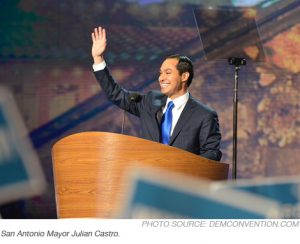Why Democrats Get Latinos Right

![]() By Cindy Casares, Texas Observer
By Cindy Casares, Texas Observer
When San Antonio Mayor Julian Castro spoke at the Democratic National Convention in September, he received varying amounts of criticism from the right. After all, by his own admission, he “doesn’t really speak Spanish.” Republicans snickered and bragged that their Latino, U.S. Sen. Marco Rubio of Florida, speaks perfect English and Spanish. Sadly, they have no idea how much that typifies their lack of relevance to the vast majority of Latino voters.
Of course, beneath the superficial fluency of a few carefully chosen candidates, the Republican Party is woefully out of step with the Hispanic community. Arizona Republicans’ ban on Latino studies classes screams that message loud and clear. In the long run, the language issue is more indicative of a lack of marketing savvy that will bite them in the collective ass.
 It’s no secret that voters tend to vote for the candidate they believe represents them most closely. A cursory look at the 2010 U.S. Census will tell you that Mexican-Americans far outnumber Hispanics of any other origin in this country. In fact, Mexicans are the largest Hispanic group nationwide, and the largest Hispanic group in all but 10 states. Additionally, according to the Pew Hispanic Center, 51 percent of all Latinos born in the U.S. are now English-dominant, and native-born Hispanics outnumber their foreign-born counterparts roughly 32 million to 19 million. Those two facts are already translating (no pun) into an impact on Hispanic media. Spanish-language networks Univision and Telemundo are, for the first time, planning bilingual content for the fall 2012 season, including Univision’s “Meet the Candidate” presidential forum, which will air in English and Spanish on television and online. Univision is also launching an English-language cable network targeted at Latinos and an English-language website. In short, speaking so-so Spanish is no obstacle to reaching the country’s fastest-growing group of Latinos. Those who are less tied to their ancestral homelands and more comfortable in English, like Castro, are the rule instead of the anomaly.
It’s no secret that voters tend to vote for the candidate they believe represents them most closely. A cursory look at the 2010 U.S. Census will tell you that Mexican-Americans far outnumber Hispanics of any other origin in this country. In fact, Mexicans are the largest Hispanic group nationwide, and the largest Hispanic group in all but 10 states. Additionally, according to the Pew Hispanic Center, 51 percent of all Latinos born in the U.S. are now English-dominant, and native-born Hispanics outnumber their foreign-born counterparts roughly 32 million to 19 million. Those two facts are already translating (no pun) into an impact on Hispanic media. Spanish-language networks Univision and Telemundo are, for the first time, planning bilingual content for the fall 2012 season, including Univision’s “Meet the Candidate” presidential forum, which will air in English and Spanish on television and online. Univision is also launching an English-language cable network targeted at Latinos and an English-language website. In short, speaking so-so Spanish is no obstacle to reaching the country’s fastest-growing group of Latinos. Those who are less tied to their ancestral homelands and more comfortable in English, like Castro, are the rule instead of the anomaly.
One could argue that Rubio, a second-generation Cuban-American, falls into the same category, and he does, but here’s the Latino marketing problem with Marco Rubio that trumps his Spanish fluency: He’s Cuban-American. Since the 1960s, Cubans have been the beneficiaries of a huge immigration double standard in this country and, for that reason, there is the perception among Mexican-Americans that Cubans, as a group, have not suffered in the United States the way other Latinos have.
From the Cuban Refugee Adjustment Act of 1966, which allowed all Cuban exiles to apply for U.S. citizenship, to the ridiculous “wet feet, dry feet” rule of 1995 that says, “If we don’t catch you in the water, you’re in,” Cubans have been set up to succeed in this country while other Latinos, and Mexicans in particular, have been scapegoated and set up to fail. This perception—whether factually accurate or not—combined with the image of an overtly bigoted Republican Party, is a political recipe for disaster.
Ask average Hispanic voters whether they want to vote for a Mexican-American who doesn’t speak much Spanish, or a Cuban-American who speaks perfect Spanish but belongs to the party that criminalized Chicano studies and passed the “show us your papers” law and built a wall between the U.S. and Mexico and wants to make English the official language of the United States. You’ll quickly see how superficial the fluency issue is.
“The Cubans have never been one of us,” retired Albuquerque educator and community activist Moises Venegas told the Associated Press in a recent article comparing Julian Castro with Marco Rubio. Venegas is Mexican-American. “They came from affluent backgrounds and have a different perspective,” he said of Cuban-Americans. “The Republican Party also has opened doors just for them.”
That Rubio didn’t come from a privileged background, and that his parents arrived in the United States in 1956, well before the Cuban Refugee Adjustment Act, doesn’t matter. In marketing, perception is reality. If the Republican Party wants to attract Latino voters, it has no choice but to stop scapegoating Mexicans. Because, like it or not, a little enclave of Cubans in Florida is not going to win over 40 other states.
This article was first published in The Texas Observer.
Cindy Casares is a columnist for the Texas Observer. She is also the founding Editor of Guanabee Media, an English-language, pop culture blog network about Latinos established in 2007. She has a Master’s in Mass Communications from Virginia Commonwealth University Brandcenter. Prior to her career in journalism, she spent ten years in New York City as an advertising copywriter. During her undergraduate career at the University of Texas she served under Governor Ann Richards as a Senate Messenger during the 72nd Texas Legislature.
[Photo by Demconvention.com]
